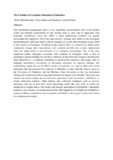Please use this identifier to cite or link to this item:
https://cris.library.msu.ac.zw//handle/11408/1651Full metadata record
| DC Field | Value | Language |
|---|---|---|
| dc.contributor.author | Shoko, Moreblessings | - |
| dc.contributor.author | Useya, Juliana | - |
| dc.contributor.author | Senderayi, Leonard T. | - |
| dc.date.accessioned | 2016-06-28T11:48:44Z | - |
| dc.date.available | 2016-06-28T11:48:44Z | - |
| dc.date.issued | 2013 | - |
| dc.identifier.uri | http://dx.doi.org/10.4172/2327-4581.S1-013 | - |
| dc.identifier.uri | http://hdl.handle.net/11408/1651 | - |
| dc.description.abstract | Geo information management plays a very significant socioeconomic role in the modern world and different professionals in this domain need to take time to appreciate their important contribution. Since the 1960’s a rapid professional evolution has greatly transcended the traditional role of the land surveyor creating clear shifts in role paradigms and blending this skill more firmly with the strengths of several other disciplines to give birth to the science of Geomatics. Evolution in this context refers to a process by which career components change their characteristics over a period, possibly into a more sophisticated form that adapts better to the demands of its changing surroundings. One of the most significant global challenges associated with evolution in Geomatics today is that of inadequate capacity building for seamless continuity of the profession. Tertiary education has been identified as a continuous contributor to professional continuity. This paper seeks to highlight Zimbabwe’s contribution to Geomatics education for capacity building. The methodology adopts the use of CIRO’s model of evaluation as a tool to effectively reveal milestones that characterised the evolution in Zimbabwe to date. Specific focus is given to the University of Zimbabwe and the Midlands State University as the two institutions offering full curriculum in Surveying and Geomatics at degree level currently. The study uses alumni and current student data records from polytechnics and universities in Zimbabwe to extract interesting statistics. Other primary data collection techniques such as surveys, interviews and use of data from social networking media like face book or twitter are employed to compile data on the student and industry perceptions in Zimbabwe’s Geomatics domain in line with the recommendations of the CIRO approach. It is hoped that Zimbabwe’s capacity building contribution may be painted colourfully in this paper as discussions about its evolution are revealed. | en_US |
| dc.language.iso | en | en_US |
| dc.publisher | SciTechnol | en_US |
| dc.relation.ispartofseries | Geoinformatics & Geostatistics;Special Issue 1 • 013 | - |
| dc.subject | Capacity building; Geomatics education; Curriculum; CIRO model; Contribution | en_US |
| dc.title | The evolution of geomatics education in Zimbabwe | en_US |
| dc.type | Article | en_US |
| item.openairetype | Article | - |
| item.languageiso639-1 | en | - |
| item.fulltext | With Fulltext | - |
| item.grantfulltext | open | - |
| item.cerifentitytype | Publications | - |
| item.openairecristype | http://purl.org/coar/resource_type/c_18cf | - |
| Appears in Collections: | Research Papers | |
Files in This Item:
| File | Description | Size | Format | |
|---|---|---|---|---|
| The Evolution of Geomatics Education in Zimbabwe.pdf | Abstract | 102.27 kB | Adobe PDF |  View/Open |
Page view(s)
102
checked on Apr 5, 2025
Download(s)
20
checked on Apr 5, 2025
Google ScholarTM
Check
Items in MSUIR are protected by copyright, with all rights reserved, unless otherwise indicated.



